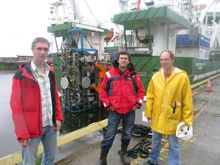2008 Press Releases
14.08.2008
Irish scientists are coordinating a major seabed drilling expedition funded through the European Science Foundation (ESF) to collect 70m long continuous records through cold-water coral reefs offshore Ireland.
"This is really exciting, we know these reefs have been growing for millions of year and recording the effects of climate change on the deep ocean within their sediments", says Dr Andy Wheeler, Department of Geology and Principal Investigator, Environmental Research Institute (ERI), University College Cork (UCC) who is the coordinator of the ESF-CARBONATE programme and chief scientist on board.
The science team from Ireland, Germany, Belgium and the Netherlands will go nearly 660 km west of Ireland to drill into seafloor targets lying over a kilometre below the sea surface on the national research vessel the RV Celtic Explorer. "This is not an easy task and we will be using a new state-of-the-art drilling rig called MeBo that we deploy off the vessel and lower onto the seabed. The rig then extends arms to jacks itself up and we start drilling controlling everything from the surface. We can and will drill through solid rock."
According to Dr Wheeler: "We are careful not to target living reefs as we are looking for the story recorded in their fossil remains. We wish to understand how these reefs grow and how they adapt to changes in climate. Many of these sites are now Special Areas of Conservation but how will they fair when the sea warms up and oceans acidify? Because they grow fast they can also enable us to have a close look a crucial periods of rapid climate change in the past helping us to unravel changes in the deep ocean that also have impacts on the long-term weather at home." Since these reefs were discovered in late 1990's, national projects such as the Irish National Seabed Survey have mapped many hundreds of these. "In fact we have now counted more than 1000 reefs, many of these several hundred metres tall and kilometres across", explained Dr Boris Dorschel, also from UCC, who will be on the expedition, "That's a lot of carbonate locked up in these reefs linked to dissolved CO2 in the oceans and the greenhouse gas in atmosphere. Understanding this link between CO2 in the atmosphere and how it gets locked up in sediments is crucial for climate modelling. We need to drill so we can work out how quickly these vast reserves have accumulated."
The RV Celtic Explorer will leave Galway today (August 14th 2008) returning on September 8th with its precious cargo of coral reef cores. The ESF-CARBONATE team led by UCC will study these over the next 3 years in laboratories through Europe.
Visit: http://www.esf-carbonate.org/
Image: Dr Boris Dorschel (UCC) left, Dr Andy Wheeler, Chief Scientist (UCC) centre and Dr Tim Freudenthal - MeBo Drill Rig manager (Uni. of Bremen) right in front of MeBo and the RV Celtic Explorer in Galway Docks just before heading to sea on August 14th 2008. Photo courtesy of Dr Henk de Haas.
808MMcS

